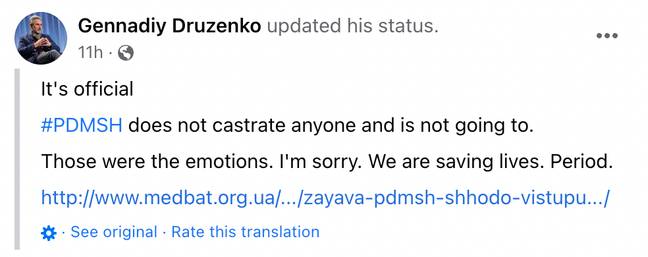Ukrainian Medic Apologises After Telling TV Interviewer He Ordered His Staff to Castrate Russian Soldiers

All Global Research articles can be read in 51 languages by activating the “Translate Website” drop down menu on the top banner of our home page (Desktop version).
To receive Global Research’s Daily Newsletter (selected articles), click here.
Visit and follow us on Instagram at @globalresearch_crg and Twitter at @crglobalization. Feel free to repost and share widely Global Research articles.
Today, the dangers of military escalation are beyond description.
What is now happening in Ukraine has serious geopolitical implications. It could lead us into a World War III Scenario.
It is important that a peace process be initiated with a view to preventing escalation.
Global Research does not support Russia’s invasion of Ukraine.
The history of this war must be understood.
The bombing and shelling led by Ukraine’s Armed Forces directed against the people of Donbass started eight years ago, resulting in the destruction of residential areas and more than 10,000 civilian casualties.
A bilateral Peace Agreement is required.
A Ukrainian medic has apologised after claiming he ordered his staff to castrate any captured Russian soldiers following their occupation of the country.
Gennadiy Druzenko took on the role of a volunteer frontline medic after Russian troops crossed the border into Ukraine last month, and he has since described himself as one of thousands of Ukrainians working to defend his country.
President Volodymyr Zelenskyy ordered men aged 18 to 60 to stay in the country to help fight against the war, with some receiving combat training while others take on tasks to further help protect Ukrainian fighters and artillery from the enemy.
Gennadiy Druzenko the owner of a war-zone mobile hospital in eastern Ukraine has told a Ukrainian TV interviewer that he has instructed his doctors to 'castrate' captured Russian soldiers. #UkraineRussiaWar #Ukraine️ pic.twitter.com/CXUnhkA9XX
— RoninBeane (@BeaneRonin) March 21, 2022
Druzenko co-founded a mobile hospital in 2014, and over the past eight years some 500 doctors have been involved in the setup, which deploys civilian doctors and nurses in the conflict zone close to separatist republics.
While speaking about his ongoing work as a medic in a recent interview with Ukraine-24, the medic claimed he has ‘always been a great humanist’ and previously he held the belief that ‘if a man is wounded, he is no longer an enemy but a patient’.
The medic then implied his opinion had changed with the invasion, however, as he told the broadcaster that he had ‘very strict orders to castrate all [captured Russian] men, because they are cockroaches, not people’.
The Investigative Committee of Russia opened an investigation into Druzenko in the wake of the comments, but the medic has since taken to social media to apologise for what he said, assuring that the hospital ‘does not castrate anyone and is not going to’, and explaining that his words came from ’emotions’.
A statement shared on the hospital’s website explained Druzenko ‘made an emotional statement about the sterilisation of the invaders’ and claimed it was ‘prompted by threats against Gennady and his family personally’.

Druzenko apologises for comments (Gennadiy Druzenko/Facebook)
The statement added that his words were ‘taken out of context and propagated by Russian propaganda channels’, before assuring it ‘has not engaged, is not engaged and does not plan to sterilise Russian invaders, let alone captured Russian soldiers and officers’.
“Our mission is to save lives… The head of PDMS apologizes for his emotions, caused, again, by brutal threats to him and his family,” it continued.
Performing castrations on soldiers would violate the Geneva Conventions, which prohibits ‘violence to life and person, in particular murder of all kinds, mutilation, cruel treatment and torture’.
*
Note to readers: Please click the share buttons above or below. Follow us on Instagram, @globalresearch_crg and Twitter at @crglobalization. Feel free to repost and share widely Global Research articles.
Featured image is from Ukraine-24/Gennadiy Druzenko/Facebook

